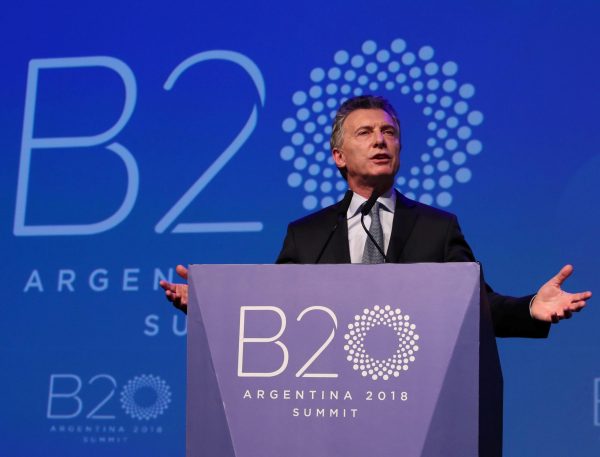All G20 leaders attend G20 summit meetings — almost without exception. Nations, some with conflicting interests, continue to send their leaders to discuss issues of relevance to them and, at times, to set the direction for the global economy. During the 2010 meeting in Toronto, leaders declared the G20 to be the premier forum for global economic cooperation.
When President Mauricio Macri decided to host the G20, he could not have anticipated the macroeconomic difficulties Argentina faces today. Nor could he have foreseen the fracturing of the international consensus on trade and climate. But the G20 comes into its own when it is most needed — more a ‘rough weather’ friend, than a ‘fair weather’ one.
Back in 2008, credit markets were freezing, stock markets tumbling and financial firms collapsing. In the 12 months from April 2008, the International Monetary Fund (IMF) downgraded its forecast for global growth in 2009 from 3.8 to negative 1.3 per cent. In response, the G20 helped coordinate discretionary fiscal stimulus averaging over 2 per cent of GDP in 2009 and 2010, and an increase in lending from multilateral development banks of US$235 billion. Perhaps the crowning achievement though was avoiding the kinds of ‘beggar thy neighbour’ and protectionist policies of the Great Depression.
Since the global financial crisis (GFC), the work of the G20 has shifted to structural issues, such as global governance reform and sustainable growth. There are still important outstanding commitments. One is to reduce the gap between male and female workforce participation by 25 per cent by the year 2025, adding more than 100 million women to the global labour force. Another is to reduce the cost of remittances to an average of 3 per cent by 2030, providing an extra US$25 billion per year by 2030 to those who need it most.
The G20 has also fallen short in some areas. It failed to meet its goal of lifting global growth by 2 per cent through structural reforms following the GFC. The ambition of the G20 will wax and wane with the interests of the membership.
Sometimes what the G20 achieves will be limited to discussions among leaders and officials. This is important. The relationships built up are invaluable — particularly during times of crisis.
We should remain optimistic about the G20, for a number of reasons. For starters, it has the right membership. The G20 includes the G7, all five permanent members of the United Nations Security Council, and all five emerging economy ‘BRICS’ — Brazil, Russia, India, China and South Africa. Members collectively make up nearly 85 per cent of global economic output, 84 per cent of global investment and 63 per cent of the world’s population.
And the G20 has avoided much of the bureaucracy besetting other international fora. There is no standing secretariat. Coordination is provided by a ‘troika’ made up of the current, past and future G20 presidencies. Much analytical support is provided by existing international organisations, such as the IMF, World Bank, Organisation for Economic Co-operation and Development (OECD) and World Trade Organization (WTO).
Argentina’s focus on the future of work will also help keep the G20 relevant. The topic resonates with leaders and their communities, and is clearly important to global economic development.
Yet the global environment is challenging — perhaps more so now than at any time since the GFC. We no longer live in a world where all the major countries accept key multilateral agreements and institutions — the Paris Agreement, the Sustainable Development Goals, and the WTO. We have taken broad support for these institutions and mechanisms for granted, and a loss of that support is confronting.
The G20 represents the pinnacle of that global rules-based system, cemented in the firm foundation of each country’s enlightened self-interest, where countries achieve more for themselves by working together.
The G20 provides a table around which leaders can explain how they see the world and understand better how others see it. And there are plenty of corridors in which leaders can have frank discussions, which does, ultimately, help to bridge divides.
The G20 is but 10 years young and we still have the opportunity to make of it what we want and need. In fact, the G20 may be needed now more than at any time since that tumultuous year when the G20 was founded.
David Gruen is Deputy Secretary of the Department of Prime Minister and Cabinet and Australia’s G20 Sherpa. The views expressed here are his own.
This article is adapted from a speech delivered by Dr Gruen at the Lowy Institute in Sydney on 1 November 2018.

